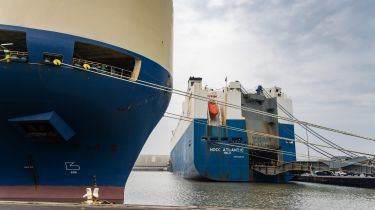Jaguar Land Rover pays for more police at UK ports to curb exports of stolen cars
The Range Rover maker spends ‘several hundred thousand pounds’ in effort to thwart stolen car exports from the UK

Jaguar Land Rover is to spend “several hundreds of thousands of pounds” helping to beef up policing at UK container ports, in a bid to thwart criminal gangs currently given free-rein by the lack of police resources.
The firm’s managing director Patrick McGillycuddy and global financial services director Chris Kent shed light on its plan to pay for extra policing at the Felixstowe, Tilbury and Southampton container facilities, during an event in Solihull showcasing the firm’s responses to soaring crime rates and insurance premiums.
Thefts of Range Rover and Land Rover products have been the focus of plenty of headlines in recent months, but Kent says JLR’s unprecedented investment in ports policing addresses a broader problem affecting many in the car industry.
“It feels at this point in time that from a security perspective, the UK could do more,” he says. “This feels like there’s a policing issue around serious and organised crime, and the port security is a real problem for us. The ability to get parts out of the ports, effectively unchecked, is certainly not helping.”
The evidence suggests that most of the luxury cars stolen in the UK, including JLR products, are shipped out of the UK in containers - either as complete cars, with up to four vehicles per container, or broken down into parts.
“The issue is really centred in the UK, and the fact we’ve got a porous border,” says Kent, who explains that JLR already tracks activity in the Middle East where raids on bodyshops allow them to see parts arriving and being applied to vehicles. He also pointed to container freeports in the United Arab Emirates as a distribution point for cars and parts making their way to West African states or other markets such as Russia.
JLR has for the last two years operated a Vehicle Theft Reduction Group, which works closely with police in the UK to monitor and respond to specific threats or vulnerabilities in JLR vehicles. According to one group member, an indication of the ease with which criminals can export stolen cars and parts is that the UK can muster a total of three vehicle crime police officers working for the National Vehicle Crime Intelligence Service at UK ports - that’s just one each at Felixstowe, Southampton and Tilbury.
McGillycuddy says it’s essential that the Home Office and police departments direct more resources to targeting the gangs, and reject the premise that insurance payouts mean it’s effectively a victimless crime.
“Everyone’s insurance has gone up by 40, 50 per cent. Everyone pays, so this is why we are determined to tackle this at the root,” he says, adding that JLR’s cash injection will go directly towards increasing police resources on the ground.
“How do we stop the theft of cars, not just our cars, everyone’s cars? How do we make policing the ports more robust, so it’s a lot more difficult to get parts and stolen vehicles out of the country, reducing the desire to steal our products or anyone else’s? We need to make it a higher priority, because people are suffering the trauma and inconvenience of their cars being stolen. Moreover we’re all now paying more for insurance, as a result of it being viewed as a ‘no harm’ crime,” he says.
JLR’s solution is to invest its own money into ports policing, says McGillycuddy, with the cash being targeted at police resources “looking at organised crime, more boots on the ground, and understanding how the criminals operate”.
Asked how he felt about having to pay for the police to carry out tasks many think they should be doing anyway, he told Auto Express: “It is what it is. We’ve got a problem and we can help solve it, so we will.”
Click here for our list of the best luxury cars...
Find a car with the experts








